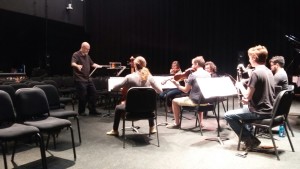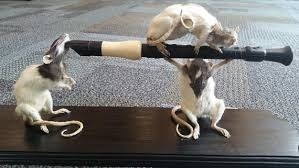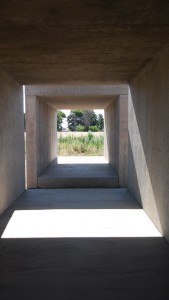photo credit: UNT Photo / Adriana Salazar Caro
We’re presenting a concert of works in Denton on September 19, featuring the works of Joseph Klein. It will include seven of Klein’s solo pieces, alongside his new ensemble work Canetti-menagerie. To mark the occasion, I thought it’d be fun to feature my colleague as our next trailblazer.
EM: With this upcoming event, I’d love to hear more about how these Canetti writings have inspired you since 1997 (or perhaps earlier?).
JK: Oddly enough, I discovered Elias Canetti‘s writings through the work of another composer, Magnus Lindberg, who himself had been influenced by Canetti’s seminal work Masse und Macht (Crowds and Power) in his 1985 composition Kraft. Intrigued by the concept behind Lindberg’s composition, I immediately went out and got a copy of Canetti’s book and was fascinated by his analysis of power systems and group dynamics, as well as his distinctive writing style. I was a doctoral student at Indiana University at the time, and several years later, after coming to UNT, I discovered Canetti’s Der Ohrenzeuge (Earwitness) at our local used bookstore — a quirky little book containing fifty brief character studies of the most bizarre, surreal personalities imaginable. It was quite the opposite of Crowds and Power, which dealt with human behavior in groups: these were paradigms of individual behaviors encapsulated into ironic, pithy caricatures. Halfway through the book, I realized that these characters were perfectly suited to musical interpretation as a series of works for various solo instruments. That was almost twenty years ago, and I have thus far composed sixteen solo works based on these characters, with more to come. In recent years, I began thinking about how these characters might interact with each other at a social gathering of sorts, and came up with an open-form chamber work titled Canetti-menagerie, which uses the material in each of the individual solo works as the basis for semi-improvisational interactions between the various performers.
EM: How has the culture of new music in North Texas (and at UNT), changed since you arrived here 2 decades ago?
JK: I think the most significant change at UNT since I’ve been here has been the dissolution of an arbitrary barrier between acoustic music and music technology that existed within the composition program at the time. When I arrived in 1992, there were computer music composers and acoustic music composers — different teachers, different students, separate courses, separate teaching assistants, even separate concert series and different performance spaces. There was relatively little integration between the two sub-groups of composers at the time. Among some of the faculty, in each camp, there was an underlying antipathy for the composers from “the other side.” Of course, this attitude was passed down to the students as well, and was not a healthy environment for building a robust community of composers, which we truly have now. Composers who are currently in the program — both faculty and students — are comfortable working in both realms, and there is much more understanding and mutual respect between what were previously two distinct areas. Needless to say, we no longer separate students, teaching assistants, or concerts based on this distinction either. I think this change in attitude over the past quarter century or so has been a natural by-product of our increasingly technological society — most people under the age of 30 take technology for granted these days, as a ubiquitous part of their lives — but sadly, there are still many composition programs around the country that practice a kind of segregation between these two worlds, which is such an antiquated mindset and completely untenable in the long run. I suppose as younger faculty are hired to these university positions, these old attitudes will eventually become a thing of the past.
As far as the performance of new music at UNT, the increasingly professional level of the Nova Ensemble (due in large part to your leadership, Elizabeth!) and the creation of a related field in contemporary music for graduate performance majors have certainly elevated both the level of new music performance and the awareness among faculty and students in general to the issues we deal with as new music practitioners. I feel that we could do an even better job creating opportunities for composers and performers to collaborate here at UNT, but I also believe that the overall quality of new music performances among students has vastly improved over the past decade or so.
EM: Your biography discusses fractal aesthetics and other abstract models for musical thought. How do you reconcile that with your engagement as a performer, and your sensitivity to the practical issues of communicating and creating music?
JK: I guess my interest in these abstract models and systems comes from my fascination with science and natural phenomena since I was young. (I was a microbiology major through my sophomore year in college, so this interest was strong enough that it almost became the basis of a career.) Perhaps the use of these processes in my music is a way that I could have my cake and eat it too — living vicariously as a “scientist” through my work as a composer! However, I am also very interested in performance, the inherent theatricality of the concert experience, and the engagement of an audience by the performers. I think it is relatively easy to square these two seemingly disparate concerns in one’s work: nature is elegant and inspiring and beautiful whether or not you understand the complex processes behind it; in the same way, a work of art can move people whether or not they understand the underlying method. This just speaks to the depth and richness of music — and nature — and how both can be appreciated and experienced in a multitude of ways; and the most engaging musical experiences to me are those that work on multiple levels.
EM: We have a shared lineage in our mentor Harvey Sollberger. I’d like to learn more about your mentors.
JK: It’s interesting that we both have Harvey as a mentor, but within two different worlds! I first met Harvey when he was a guest artist at UC San Diego during my first year in the masters program there, back in 1985. I got along with him immediately, and was inspired by his energy, passion, and ideas, and the fact that he is such a versatile musician (also a conductor, of course, as well as a flutist and composer). Even though I had just started at UCSD, I decided then that I wanted to work with Harvey for my doctorate at Indiana University, which I eventually did. While at IU, I also had the pleasure of playing bassoon and contrabassoon in the New Music Ensemble there, which Harvey directed, and served as assistant director of that ensemble for a time. To this day, I consider Harvey to be one of my good friends and a very important role model. When Harvey left IU (to teach at UCSD, ironically!) in 1990, I finished my studies with Claude Baker, who was also an excellent mentor, and quite different from Harvey in his approach. Backtracking a bit, I should also mention that at UCSD, my major professor was Robert Erickson, whom I had the good fortune to work with during the last few years of his tenure there; however, I would be remiss if I did not mention another important UCSD mentor of mine, Roger Reynolds. I only had the opportunity to study with Roger for 10 weeks (during my first year in the program, when the new graduate composers were required to rotate faculty studios throughout the year); but In hindsight, those were probably the most critical ten weeks in my artistic development, as I credit Roger with setting me on my future trajectory as a composer.
EM: You are a great advisor to students. Do you have any general advice to practitioners and advocates of new music? Audiences?
JK: I think performers, composers, and other devotees of new music have an obligation to build audiences by creating opportunities for interesting and challenging programs, as well as providing listeners with the proper tools to appreciate unfamiliar music through various types of audience outreach. With so many traditional ensembles dependent on ticket sales and filling concert halls in order to survive, a lot of the contemporary repertoire has been watered down by mediocre music that has been commissioned and programmed in an effort to pander to their patrons — which I think is an insult to both the artists and the audience. Composers and performers have an obligation to meet the audience halfway in order to raise their awareness and create an environment conducive to more demanding music. To this end, performers should create opportunities to share their insights as interpreters, demonstrating musical passages to help guide listeners; composers should do the same by providing insights on the creative process, thus enhancing the listeners’ experience and elevating what we can expect from our audiences. I have heard some composers claim with a tinge of haughtiness that “the music should speak for itself,” that it is somehow a weakness of the work or the composer to explain one’s compositional process to an audience. I think this is a cop out — a lazy excuse not to engage with an audience and allow them to experience one’s work on a deeper level. If it enriches the experience, why not provide the listener with these additional insights?
Maintaining one’s integrity as an artist can be a real challenge if one wants to succeed in the current musical environment. With that in mind, there are a couple of quotes that are worth referencing here, and which touch upon my own philosophy as a composer. The first is from Frank Zappa, who once said: “I [compose] to amuse myself. If I like it, I release it. If somebody else likes it, that’s a bonus.” The second quote is by Steven Stucky, from his article “Listening to Contemporary Music”: “…a composer’s duty is not to any particular listener of any particular imagined audience: a composer’s duty is to the work itself.” I consider it a luxury to have a university teaching position, which frees me up to do the things that truly interest me as a composer, and not to depend on accommodating commissioning bodies, ensemble boards, and marketing departments. That may sound a little selfish, I suppose, but it is also liberating to be able to take risks and push my own limits without concern for the financial consequences. And hopefully, the work I create will be of interest to a few others along the way.



